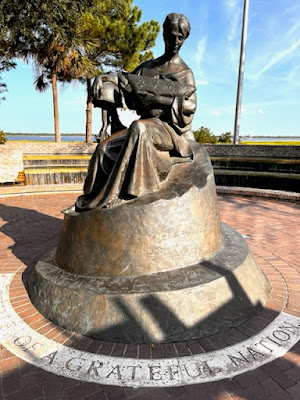Authors' Note: les États-Unis (lay zay-TAH-zoo-nee, or as here, lay ZAY-tah-zoo-nee): French for '(the) United States'
compris (com-PREE): French for 'understood' or 'included'
os Estados Unidos, the name in Portuguese, here using the rhyming properties of the Brazilian dialect [OHS, etc.]
huddled masses: a phrase from Emma Lazarus's 1903 "The New Colossus", a sonnet that is engraved at the base of New York's Statue of Liberty.
The United States of America, or USA (capital — Washington, D.C.), initally formed in 1781 by merger of the thirteen colonies along the Atlantic coastline of British North America, has a Constitution dating from 1787, but no declared official language; English (American) is the de facto language of use. Millions of native speakers of French, Spanish and Portuguese (not to mention Canadian and other variants of English) make their homes elsewhere in the Americas; also, due to intermittently open immigration policies, significant linguistic minorities of foreign language speakers are now scattered through, and contribute to the cultural landscape of the United States, or US. Italian, a major linguistic influence, has exerted its role there primarily through immigration from Europe, as no Italian colonies have ever been established in the Americas.
The authors acknowledge substantial inspiration by OEDILFian prodigy speedysnail's "country" verses.
compris (com-PREE): French for 'understood' or 'included'
os Estados Unidos, the name in Portuguese, here using the rhyming properties of the Brazilian dialect [OHS, etc.]
huddled masses: a phrase from Emma Lazarus's 1903 "The New Colossus", a sonnet that is engraved at the base of New York's Statue of Liberty.
The United States of America, or USA (capital — Washington, D.C.), initally formed in 1781 by merger of the thirteen colonies along the Atlantic coastline of British North America, has a Constitution dating from 1787, but no declared official language; English (American) is the de facto language of use. Millions of native speakers of French, Spanish and Portuguese (not to mention Canadian and other variants of English) make their homes elsewhere in the Americas; also, due to intermittently open immigration policies, significant linguistic minorities of foreign language speakers are now scattered through, and contribute to the cultural landscape of the United States, or US. Italian, a major linguistic influence, has exerted its role there primarily through immigration from Europe, as no Italian colonies have ever been established in the Americas.
The authors acknowledge substantial inspiration by OEDILFian prodigy speedysnail's "country" verses.
Readers of this blogpost might note that the verse and notes in total give thirteen different names for today's country of interest, matching the original number of colonies that banded together. (Apologies are made to aboriginal groups, who could not be included in the discussion owing to lack of space.)
You can review our collection of verses about various individual nations, and about the groupings to which they belong, on our topic-based blog "Edifying Nonsense". Click HERE.
For the purpose of this blog, a 'brief saga' is defined as a poem, usually narrative, but occasionally expository, that tell its story in at least 15 lines. Most commonly, the format involves three stanzas in limerick form, constituting a single submission to the online humor site 'Omnificent English Dictionary in Limerick Form'. On the OEDILF site, rigorous standards for content and format are involved in a collaborative editing process that may take several weeks to over a year.
There are now over 40 of these lengthier bits of doggerel featured at OEDILF in Giorgio's "Author's Showcase". The OEDILF number for each accepted multiverse poem is shown here on the slide with its first verse. We have been blog-publishing these poetic adventures here monthly since January 2020. And the good news is that almost all limerick-derived verses can be set to music!
To access all of our 'brief sagas' by the year of their creation, click on your selection below.





No comments:
Post a Comment